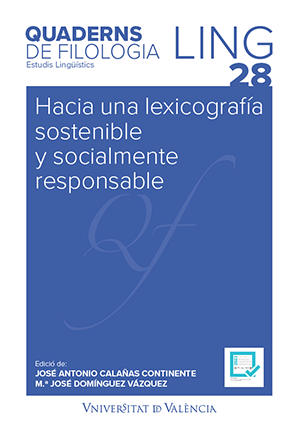Reusing the structure of the PORTLEX dictionary to create a contrastive dictionary of Romance languages: a proposal.
DOI:
https://doi.org/10.7203/qf.0.26560Keywords:
Romance languages, multilingual database, learner’s dictionary, language preservation, sustainability Abstract
Abstract
This paper proposes the development of a multilingual online dictionary for the Romance languages, called DiCoRom, using an integrative, cross-lingual and pedagogical approach. The dictionary would be based on the database structure and user interface of the existing lexicographic project PORTLEX. The objectives of DiCoRom, its target users and the necessary adaptations to the database and interface are discussed. The paper shows how the structure of PORTLEX can serve as a basis for another lexicographic project, but emphasises the need to redesign the interface to take account of the pedagogical and social orientation of DiCoRom, including the organisation of data and the inclusion of accessible examples for beginners.
 Downloads
Downloads
Downloads
Published
How to Cite
-
Abstract653
-
PDF316
Issue
Section
License
 Este obra está bajo una licencia de Creative Commons Reconocimiento-NoComercial-SinObraDerivada 4.0 Internacional.
Este obra está bajo una licencia de Creative Commons Reconocimiento-NoComercial-SinObraDerivada 4.0 Internacional.
Authors who publish with this journal agree to the following terms:
- Authors retain copyright and grant the journal right of first publication with the work simultaneously licensed under a Creative Commons Attribution License that allows others to share the work with an acknowledgement of the work's authorship and initial publication in this journal.
- Authors are able to enter into separate, additional contractual arrangements for the non-exclusive distribution of the journal's published version of the work (e.g., post it to an institutional repository or publish it in a book), with an acknowledgement of its initial publication in this journal.
- Authors are permitted and encouraged to post their work online (e.g., in institutional repositories or on their website) prior to and during the submission process, as it can lead to productive exchanges, as well as earlier and greater citation of published work (See The Effect of Open Access).




